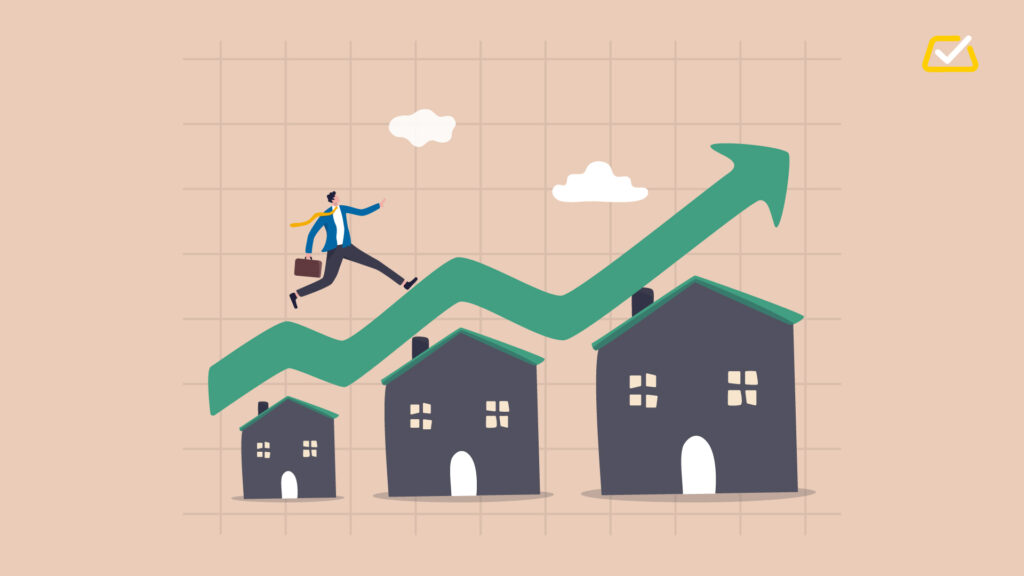Inflation has always been one of the most debated topics in the world of finance. Prices of goods and services rise, the value of money falls, and investors start worrying about how to protect their wealth. One of the biggest questions people ask in such times is: Is real estate a good investment during inflation?
The answer, in most cases, is yes. Real estate has historically been considered a hedge against inflation. But like any investment, it comes with both advantages and risks. Let’s dive deeper into why real estate may be one of the smartest places to put your money when inflation rises.
Real Estate and Inflation: The Connection
Real estate is often referred to as a tangible asset, meaning it holds intrinsic value. Unlike paper money, which loses value when inflation rises, a property is a physical asset that appreciates over time.
When inflation occurs:
- Construction costs go up.
- Rental prices usually rise.
- The demand for property increases, especially in growing economies.
All of these factors combine to make real estate a resilient investment choice during periods of high inflation.
Why Real Estate is a Hedge Against Inflation
1. Property Values Rise with Inflation
As the cost of raw materials, labor, and land increases, the overall value of homes and commercial spaces tends to rise as well. This means your property could naturally appreciate in value during inflation, preserving your purchasing power.
2. Rental Income Increases
If you own a rental property, inflation often works in your favor. Landlords can increase rents to match the rising cost of living. This helps maintain steady cash flow and ensures that your real estate investment keeps up with inflation.
3. Fixed-Rate Mortgages Become More Attractive
If you’ve locked in a fixed-rate mortgage, you’re essentially paying back your loan with money that is worth less over time. While your mortgage payments remain the same, your rental income or property value could rise, giving you an edge against inflation.
4. Tangible Asset Security
Unlike stocks or bonds, which can fluctuate wildly with market volatility, real estate is a physical asset. People will always need housing and commercial spaces, which gives real estate a fundamental level of security.
Comparing Real Estate with Other Investments During Inflation
| Investment Type | Inflation Impact | Pros | Cons |
|---|---|---|---|
| Real Estate | Property values and rents rise | Tangible asset, steady cash flow, mortgage benefits | Requires high capital, maintenance costs |
| Stocks | May fall due to higher interest rates | High return potential | Volatile, sensitive to market conditions |
| Bonds | Value decreases as interest rates rise | Stable income in normal times | Poor hedge against inflation |
| Gold | Value usually rises during inflation | Safe haven, liquid | No income generation |
From this comparison, it’s clear that real estate strikes a balance between security and income, making it a strong candidate for inflationary times.
Risks of Investing in Real Estate During Inflation
While real estate has many advantages, it’s not completely risk-free. Here are some challenges to keep in mind:
- High Purchase Costs – With inflation, property prices rise, making it harder for first-time investors to enter the market.
- Rising Interest Rates – Central banks often increase interest rates to fight inflation. This can make mortgages more expensive if you haven’t locked in a fixed rate.
- Liquidity Issues – Unlike stocks or gold, selling real estate takes time. You may not be able to quickly cash out if you need funds.
- Maintenance Expenses – Property ownership comes with ongoing costs like repairs, taxes, and insurance, which may also rise during inflation.
Strategies to Maximize Real Estate Investment During Inflation
If you’re considering real estate as an inflation hedge, here are a few smart strategies:
- Invest in Rental Properties – Regular rental income can offset rising living costs.
- Choose Fixed-Rate Mortgages – Protect yourself from rising interest rates by locking in a stable payment plan.
- Focus on High-Demand Areas – Properties in urban centers, near job hubs, or in growing neighborhoods appreciate faster.
- Diversify Across Property Types – Mix residential, commercial, and vacation rentals to reduce risk.
- Leverage Inflation-Linked Rent Agreements – Some leases allow rent increases tied directly to inflation indexes.
Expert Insights: Why Real Estate Still Wins
Financial experts often agree that real estate remains one of the most effective tools to preserve wealth during inflation. Unlike cash savings that lose value, a well-chosen property not only appreciates but also generates passive income.
For example, if inflation rises at 5% annually, your savings account earning 3% interest is actually losing value. On the other hand, a rental property that increases rent by 5–7% yearly not only preserves value but grows your wealth.
Final Thoughts: Is Real Estate a Good Investment During Inflation?
So, is real estate a good investment during inflation? The answer is a resounding yes—if done wisely. Real estate is a proven hedge, providing both appreciation and income in times of rising prices. While risks like higher purchase costs and reduced liquidity exist, the long-term benefits often outweigh the drawbacks.
By choosing the right location, locking in fixed-rate financing, and focusing on income-generating properties, investors can safeguard their wealth and even thrive during inflation.
In short, real estate doesn’t just survive inflation—it often benefits from it.

